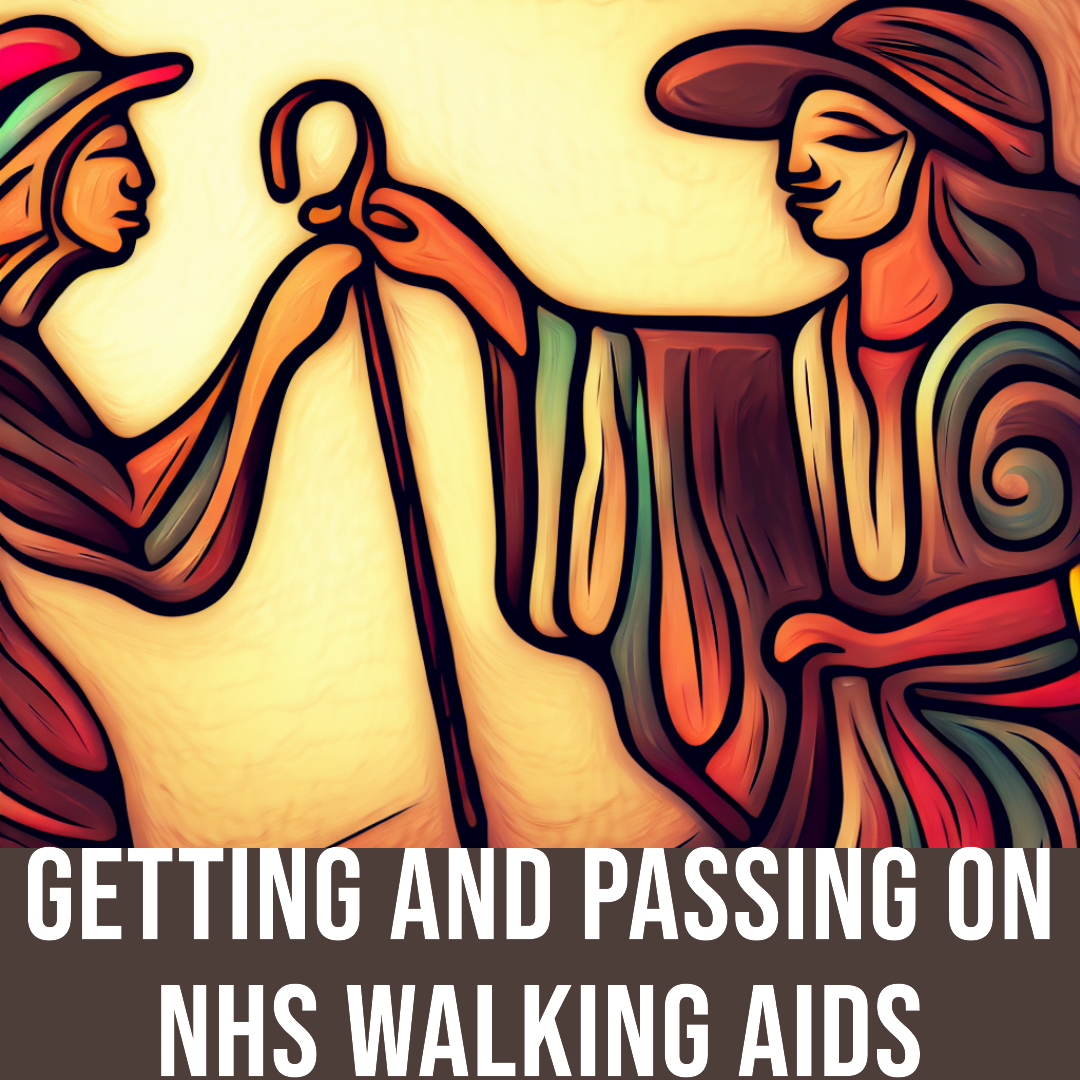
NHS Walking and Mobility Aids: How to get them and make sure they are recycled or reused
Share
How to get walking and mobility aids in UK and how to make sure they are reused
Overview of NHS Mobility Aids
NHS offers a range of mobility aids, from walking sticks to wheelchairs. These aids are crucial for individuals with mobility issues. Some people only need them for a short time after a minor injury such as a sprain or sports injury.

Why Reuse Matters
Reusing these aids is not just cost-effective but also eco-friendly. Too often, walking aids are not returned to the NHS after the user no longer needs them. This results in significant unnecessary spending.
Reusing walking aids also benefits the environment. Manufacturing new medical devices has a sizable carbon footprint. Reusing just one metal walker can save over 20kg of CO2 emissions. Appropriately sanitising and refurbishing used aids for new patients saves resources and energy.
Quick Fact: The NHS estimates over £15 million is wasted annually replacing unreturned equipment.
Main Points
- Different NHS mobility aids
- Steps to acquire them
- The significance of reuse
Types of NHS Mobility Aids
Walking Sticks
- Purpose: Extra stability and balance.
- Cost: £5 to £30 if bought.
-
Features: Multi-footed or seat-equipped options.

Walking Frames (Zimmer Frames, Rollators)
- Purpose: Greater support than sticks.
- Cost: £40 to £200 if bought.
- Features: Options with wheels, seats, or storage.
Wheelchairs
- Purpose: For those unable to walk.
- Cost: £150 to £1,000+ if bought.
-
Features: Manual and electric variants.

Mobility Scooters
- Purpose: For long-distance and outdoor use.
- Cost: £500 to £5,000+ if bought.
- Features: Different steering and storage options.
- Note: Mobility Scooters ARE NOT generally available from the NHS
| Aid Type | Purpose | Cost Range | Special Features |
|---|---|---|---|
| Walking Stick | Stability and balance | £5-£30 | Multi-footed, seats |
| Walking Frame | Greater support | £40-£200 | Wheels, seats, storage |
| Wheelchair | For non-walkers | £150-£2,000+ | Manual or electric |
| Scooter | Long distances | £500-£5,000+ | Various steering options |
How to Acquire NHS Mobility Aids
Consult a Medical Professional
- Initial Step: Schedule an appointment with a GP or physiotherapist.
- Assessment: Your mobility needs will be evaluated.
The Assessment Process
- Physical Tests: May be required.
- Questions: About your daily activities and mobility limitations.
Costs and Fees
- Free Options: Some aids are provided at no cost.
- Charges: Others may require a nominal fee like a small deposit of £5
Steps to Acquire an Aid
- Consult: Visit a GP or physiotherapist.
- Assessment: Undergo a thorough evaluation.
- Receive Aid: Choose between pick-up or delivery.
Why Some People Buy Their Own Aids
Insights from the UK Community
- Lack of Eligibility: “I would have almost certainly not have met the criteria to be given a wheelchair.”
- Immediate Need: “People might eventually get some kind of financial help for a really good chair that fits them. But then again, many don’t.”
- Quality and Customization: “I bought custom side stix out of pocket. 10 years later they are still going strong.”
- NHS Limitations: “NHS is designed to give you what you need to survive, but not to thrive.”
Note: These insights are from a Reddit thread discussing why people in the UK buy their own mobility aids.
Reuse and Recycling of NHS Mobility Aids
Properly returning walking aids saves taxpayer money and environmental resources. It may only take a few minutes to give your unneeded equipment another life. With all of us working together, we can make healthcare more sustainable.
NHS Reuse Programs
- Drop-off Points: Various NHS facilities accept returned aids. Visit Recyclenow to get a list of destinations
- Refurbishing: Aids are cleaned and repaired for future use.
Alternative Options for Returning Aids
- Hospitals: Designated areas for aid return. Ask at your next clinic or call your local NHS Trust
- Pharmacies: Some accept used aids. Ask at your local chemist.
Can’t Return Your Mobility Aid? We’ve Got You Covered
If you can’t return or recycle your aid, DisabilityHealthShop.com offers a solution.
How It Works
- Request a Label: Contact us, and we’ll send you a shipping label. Calll 0800 567 7812 or email shop@disabilityhorizons.com
- Collection: Use the label to have the aid collected.
- Quality Check: We’ll clean, test, and service the aid.
- Reusing: The aid will help another disabled person.
Your Reward
As a thank you, we’ll give you a £5 voucher to use on our website for your help and time.
Why Reuse Matters
- Financial Benefits: Helps NHS save funds and offers vouchers through DisabilityHealthShop.com.
- Environmental Impact: Reduces waste and carbon footprint.
Conclusion
Summary
- Types of Aids: NHS offers a variety of mobility aids.
- Acquisition: Consult professionals and undergo assessments.
- Reuse: Important for both financial and environmental reasons.
- Alternative Options: Why some people buy their own aids.
Do you have crutches, a rollator or walking sticks that you no longer need?
Please get in touch: If you have an NHS walking aid you no longer need, consider returning it or contact shop@disabilityhorizons.con for a return label. It’s a win-win for everyone.
Quick Recap
- Consult a GP or physiotherapist for an aid.
- Return the aid when no longer needed.
- Consider buying your own pre-owned aid for specific needs.
Further Reading for NHS Walking Aids Reuse
These links offer detailed info on acquiring walking aids, funding options, and ensuring safe and effective reuse.
- NHS Social care and support guide: Walking aids, wheelchairs and mobility scooters
- NHS Social care and support guide: Household gadgets and equipment
- The House of Commons Library: Finding funding for disability aids
- NHS England: Walking aid reuse
- Age UK: Factsheet 42 - Disability equipment and home adaptations
- Scope: Paying for disability equipment and assistive technology
